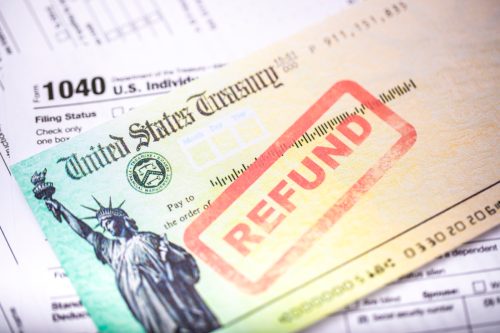IRS May Owe You Money, But You Must Claim It by July 17
You could end up missing out on thousands if you don't act in time.

The 2023 tax season ended in April, which means most of us are not planning to think about our taxes again until next year. But this strategy could put you at risk of losing out on money you're owed. Certain taxpayers may be eligible to receive a refund from the Internal Revenue Service (IRS), which owes over a billion in unclaimed tax refunds. The catch is, you have less than a month left to claim it. Read on to find out if you need to take action by July 17.
READ THIS NEXT: The No. 1 Reason You Could Get Audited by the IRS, Experts Warn.
Millions of people haven't claimed their 2019 refunds.

In a June 8 press release, the IRS revealed that it is sitting on nearly $1.5 billion worth of unclaimed tax refunds from 2019. According to the agency, close to 1.5 million people across the U.S. are still eligible to receive these pre-pandemic funds—if they act fast enough.
"Time is running out for more than a million people to get their tax refunds for 2019," IRS Commissioner Danny Werfel warned in a statement. "Many people may have overlooked filing a 2019 tax return due to the pandemic. We don't want people to miss their window to receive their refund."
But you only have until July 17 to get your money.

Even if you're late on filing your return, taxpayers typically have three years after the deadline in which they can still file and claim their tax refunds, according to the IRS. After that, any money you were owed but did not claim in time becomes property of the U.S. Treasury.
But with 2019 tax returns, this timeframe has been extended.
"Usually, the normal filing deadline to claim old refunds falls around the April tax deadline, which was April 18 this year for 2022 tax returns," the IRS explained. "But the three-year window for 2019 unfiled returns was postponed to July 17, 2023, due to the COVID-19 pandemic emergency."
RELATED: For more up-to-date information, sign up for our daily newsletter.
The IRS is urging taxpayers to check their records to see if they need to file.

In order to claim your money, you will need to submit a 2019 tax return by the July 17 deadline. And unlike your standard taxes, you won't be able to file online. As IRS spokesperson Eric Smith explained to The Seattle Times, the agency only allows returns to be filed electronically up to two years after their deadline.
With that in mind, your 2019 returns "must be filed on paper, whether self-prepared or submitted with the assistance of a paid preparer," Smith confirmed. And per the IRS, "the law requires taxpayers to properly address, mail and ensure the tax return is postmarked" by July 17 in order to be eligible for any refund.
"We encourage people to check their records and act quickly before the deadline," Werfel said. "The IRS has several important ways that people can get help."
The thought of filing a return from three years ago may seem daunting, but the agency said there are still plenty of ways to gather the information you need to file before the deadline. If you're unable to get copies of key documents—like your W-2 forms from 2019—from your employer or bank, you can order a free wage and income transcript on the IRS website.
"For many taxpayers, this is by far the quickest and easiest option," the agency noted.
Some people could get thousands of dollars back.

The average refund per taxpayer for the 2019 tax year was $893, according to the IRS. But that's not the only money you stand to miss out on if you never claimed your refund.
"Taxpayers could lose more than just their refund of taxes withheld or paid during 2019," the agency warned.
As the IRS explained in its press release, many low and moderate-income workers could also still be eligible to receive the Earned Income Tax Credit (EITC) from 2019. This credit "helps individuals and families whose incomes were below certain thresholds in 2019" and was worth as much as $6,557 that year.
Of course, you might not get your full refund amount back even if you do file before the three-year deadline—depending on your circumstances.
"The IRS reminds taxpayers seeking a 2019 tax refund that their checks may be held if they have not filed tax returns for 2020 and 2021," the agency added. "In addition, the refund will be applied to any amounts still owed to the IRS or a state tax agency and may be used to offset unpaid child support or past due federal debts, such as student loans."
Best Life offers the most up-to-date financial information from top experts and the latest news and research, but our content is not meant to be a substitute for professional guidance. When it comes to the money you're spending, saving, or investing, always consult your financial advisor directly.





















